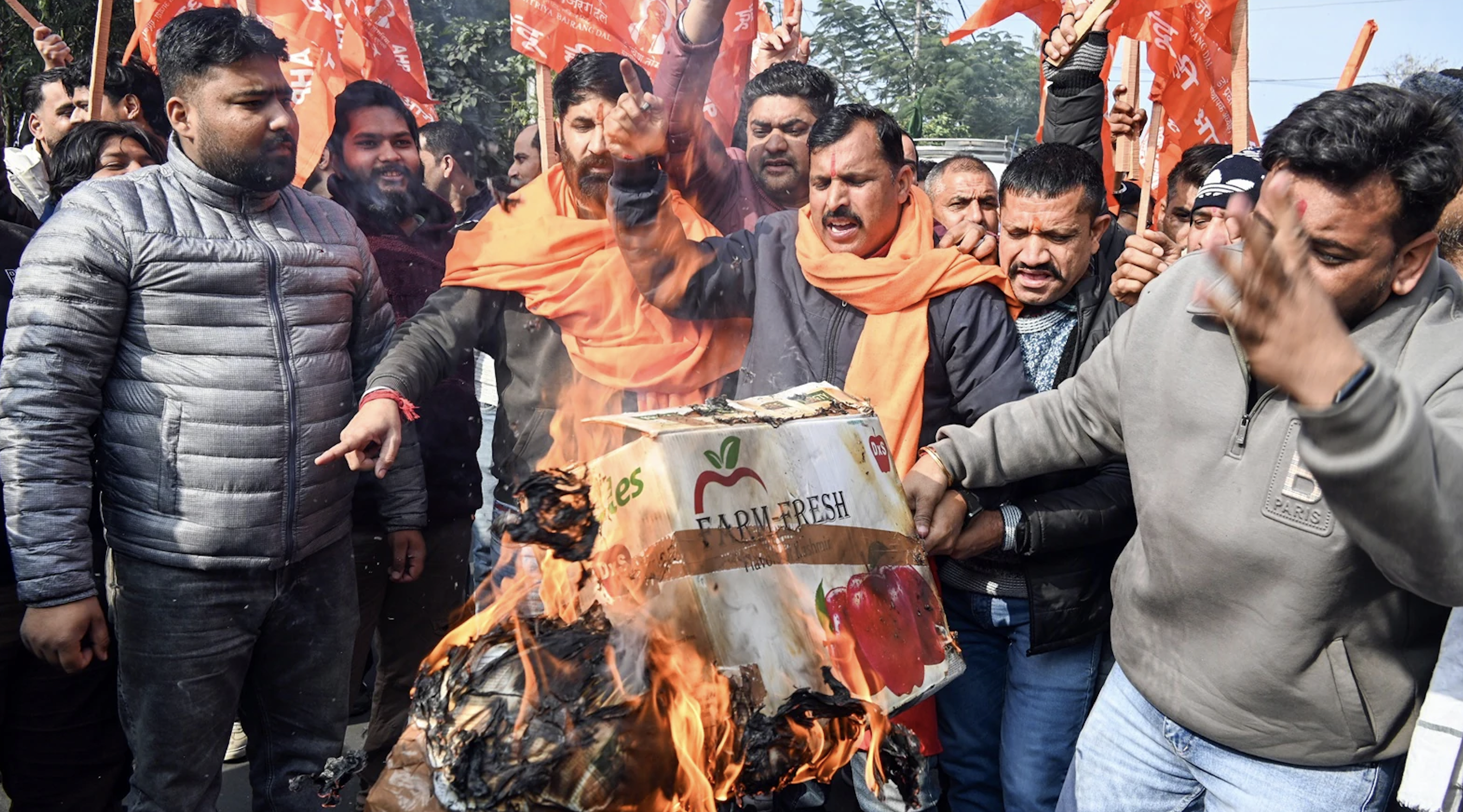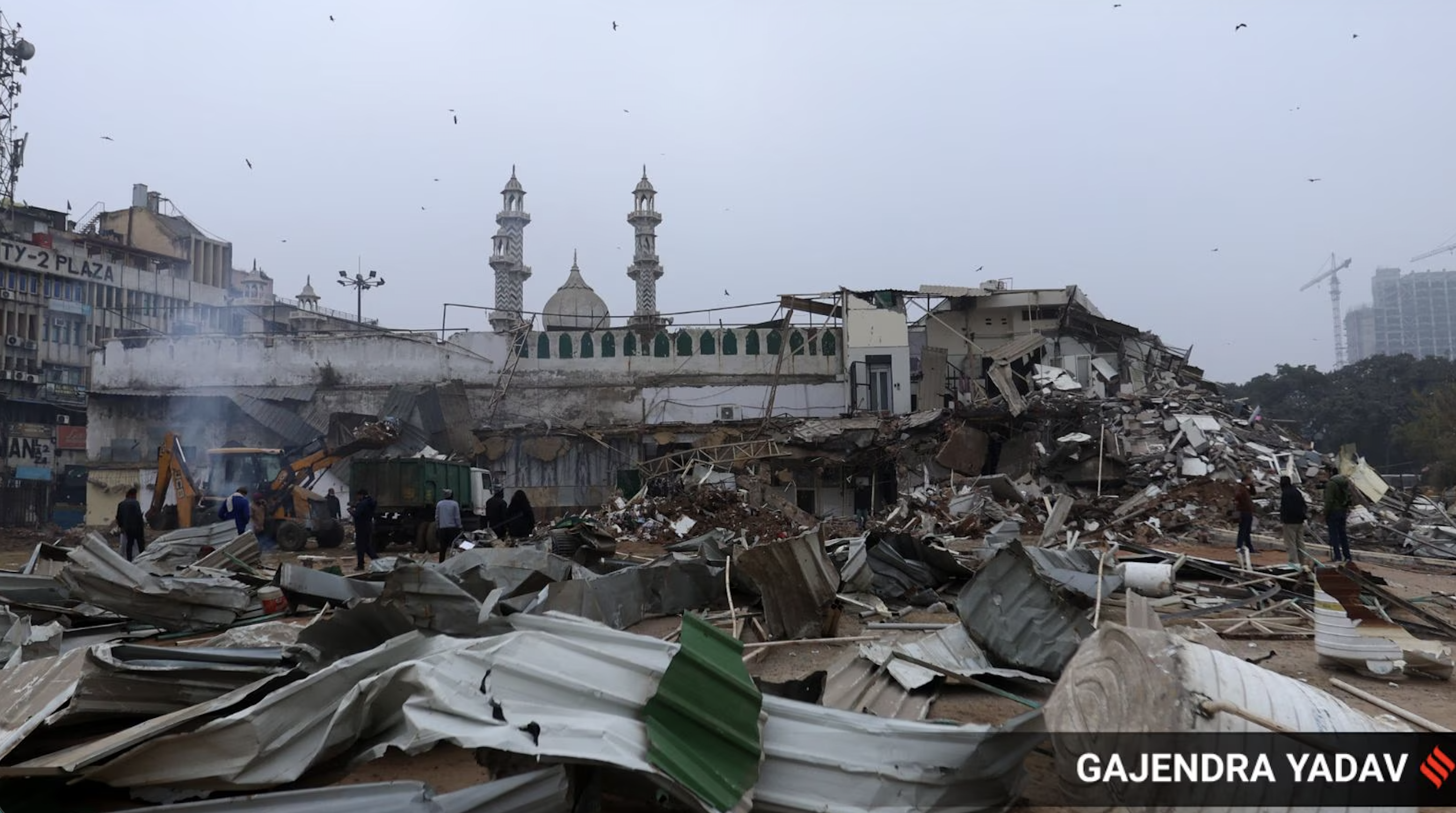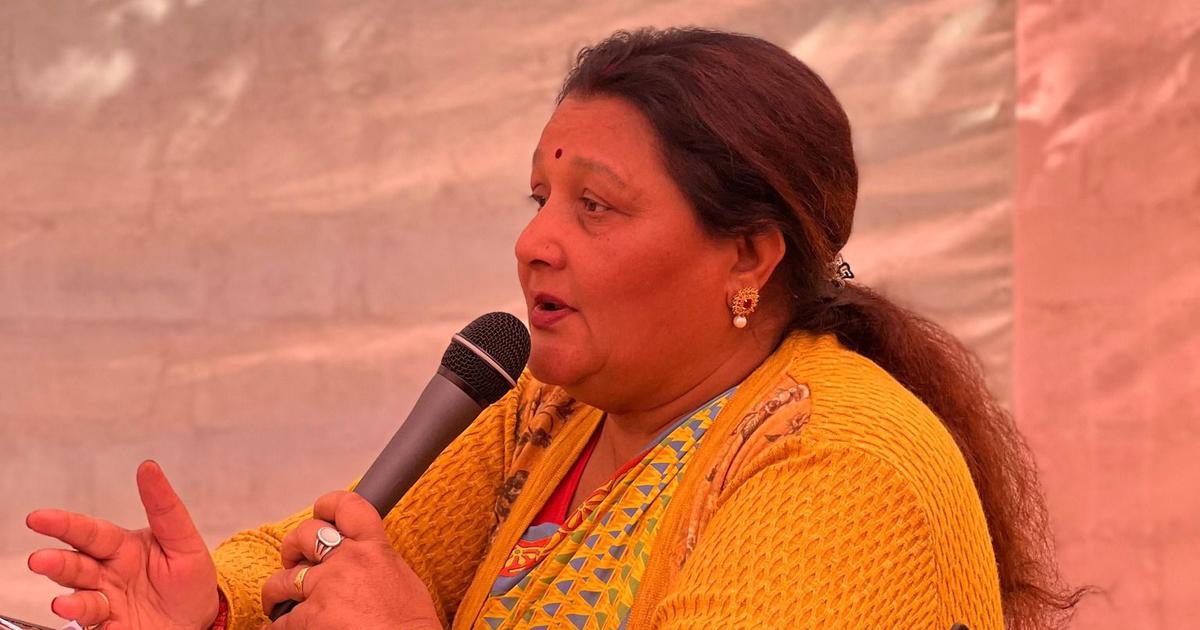
Srinagar: On 2 November, the Jammu and Kashmir (J&K) administration terminated the services of two senior government employees for alleged links with militant groups. The termination order, issued on the orders of Lt Governor Manoj Sinha, quoted Article 311 (2) (c) of the Constitution.
One of those sacked was Feroz Ahmad Lone, then deputy superintendent of jails and posted in Jammu. His termination order read: “The Lieutenant Governor is satisfied under sub-clause (c) of the proviso to clause (2) of Article 311 of the Constitution of India that in the interest of the security of the state, it is not expedient to hold an enquiry…”
The second termination order was issued to Javid Ahmad Shah, then principal of a government girls school in Bijbehara town in the southern district of Anantnag. The order he received was almost identical.
These dismissals are the latest in a crackdown by the lieutenant governor’s administration in J&K against its own employees for alleged “anti-national activities”.
The men whose services were terminated from government jobs in November, like many of those similarly dismissed over the past few months, found the order quoted Article 311(2)(C) of the Constitution, which deals with the dismissal, removal, or reduction in rank of a government employee.
Article 311 is designed to be a safeguard against arbitrary dismissal of civil servants, ensuring that they get the chance to respond to any charges they may face in an inquiry. This also obligates the authority to give the employee a reasonable opportunity to be heard and to inform him or her of the grounds of dismissal.
The Kashmir administration, however, has invoked a single sub-clause of a proviso to bypass the departmental inquiry process before dismissing a government employee.
Clause (2) of Article 311 specifies three situations in which an inquiry may be skipped.
The third situation, under which at least two dozen employees have been dismissed in Kashmir over the past six months, is sub-clause 2(c), which reads: “Where the President or the Governor, as the case may be, is satisfied that in the interest of the security of the State, it is not expedient to hold such inquiry.”
The J&K administration in fact constituted a task force earlier in 2021 with the express task of locating employees to be dismissed in this manner.
Constitutional law scholar and Article 14 editorial board member Gautam Bhatia said Article 311(2)(c) is one of a series of “escape clauses” in the Indian Constitution that “permit executive impunity”, the scope of which courts have failed to restrict.
“In particular, ‘security of the State’ is a very vague phrase that allows a lot of leeway to the State,” said Bhatia over email. “It makes abuse of power easy and also legal.”
He said that while Article 311(2)(c) itself says the main provision, to protect employees from arbitrary dismissal, will not apply when it is invoked, other constitutional guarantees including the right against arbitrary state action and the right to equal protection of law continue to apply.
“In that context, these procedures are constitutionally suspect,” Bhatia said, “although it needs to be noted again that even in the general administrative law context, courts have often held that the form that the departmental enquiries should take often depends on context.”

Purging Govt Offices Of ‘Anti-Nationals’
Since the abrogation of Article 370 on 5 August 2019, the J&K government has issued several executive orders that it claimed were directed towards ensuring that government departments are free of employees with suspect loyalties.
The crackdown on government employees comes against a wider crackdown on freedom of speech and expression in the region since the erstwhile state was split into two union territories and its autonomy revoked in August 2019.
Several measures were taken by the LG administration to regulate the freedoms of citizens. These included an unprecedented communication shutdown, arrest of lawyers and other professionals, cases against journalists, sacking new government employees whose social-media history revealed political opinion and a media policy that menaces its journalists.
Since 2019, the J & K administration has filed criminal cases against more than 2,300 people in more than 1,200 cases under the Unlawful Activities (Prevention) Act (UAPA), 1967, and 954 people under the Public Safety Act (PSA), 1978.
About two dozen government employees have been sacked since August 2019.
Political activists in the Valley said this crackdown on state employees was a tool to control them and to monitor dissenting voices among their ranks.
Selectively Quoting The Constitution
Among the executive orders issued was a mandatory vigilance clearance for government employees seeking to obtain a passport, according to an order issued in September 2021.
On 6 March, the administration issued a circular empowering itself to monitor the social media accounts of its employees.
The circular made it mandatory for new recruits in government service to submit details of their social media accounts and other details for police verification, failing which their salaries would be stopped. Individuals with “dubious character antecedents and conduct” had been paid salaries without the mandatory verification, the order said.
On 21 April, a special task force (STF) was announced to investigate government employees and terminate them under Article 311(2) (c).
The commissioner-secretary issued a notification for the constitution of the STF, to be headed by J&K’s intelligence chief. It would identify and scrutinise government employees who may be “involved in any cases related to posing threat to the security” or “anti-national activities”, the notification said.
It said the STF would scrutinise cases of employees suspected of activities requiring action under Article 311(2)(c).
A week later, the lieutenant governor ordered the termination of three government employees: school teacher Idrees Jan from Kupwara, assistant professor Abdul Bari Naik from Kulgam and naib tehsildar (a deputy to the block’s senior-most revenue department official) Nazir Ahmad Wani from Pulwama district.
Among the nearly two dozen staffers terminated under this clause, the reason cited for a summary dismissal is, most commonly, “in the interest of the security of the state”.
Dispossessing Workers Amid High Unemployment
Local mainstream political parties criticised the administration’s move to terminate employees without instituting an inquiry.
“Contrary to the Government of India’s tall claims of getting investment to create employment, they are deliberately laying off government employees despite knowing that people in J&K rely on government jobs for their livelihood,” former chief minister and president of the Peoples Democratic Party (PDP) Mehbooba Mufti said in a statement on 24 September.
Alleging that employees have links to militants is the “new excuse used to dispossess and humiliate Kashmiris”, she added.
The J&K government employs about 450,000 people. With few industries or private-sector jobs, the government is the region’s biggest employer.
According to the Periodic Labour Force Survey(PLFS) for the third quarter of financial year 2020-2021, the latest available, conducted by the National Statistical Office under the union ministry of statistics and programme implementation, J & K has India’s highest unemployment rate: 17.8%.
Shafqat Nazir, a senior advocate at the J & K high court, questioned why the authorities did not conduct inquiries before terminating employees.
“Is the situation in Kashmir so bad that they cannot conduct an inquiry?” said Nazir. “As far as we know, there is no declared emergency.”
‘Terminated For Highlighting Social Problems’
Abdul Bari Naik, 38, of the Khrewan Chadder hamlet in south Kashmir’s Kulgam district, was terminated from service on 30 April 2021.
The services of Naik, who was the head of the department of geography at the Government Degree College in Udhampur, were terminated in April, while he was in jail since 6 March, with three cases filed against him in 2018 and 2019, including two under the UAPA.
Naik’s younger brother Abdul Rouf said his brother was dismissed for being vocal about social issues and corruption in government departments.
“He never said anything against the country. He was terminated for highlighting the issues of people on social media, without even an inquiry, notice or verification,” Rouf told Article 14. “He was not given a chance to be heard.”
A former student activist while studying at Aligarh Muslim University, Naik wanted to talk about social issues when he returned to Kashmir, hoping to be a college teacher.
On holidays and in his spare time, Naik recorded himself talking about issues such as corruption, the Right To Information (RTI) Act, 2005, and drug abuse. His videos were widely shared on social media. In one video uploaded on his Facebook page, for example, Naik spoke about public grievances against road tolls. The video clocked about 70,000 views.
Rouf recalled that his brother had posted some videos about specific government officials. He had also filed an RTI application seeking information on a scheme run by the district magistrate’s office in Kulgam to recruit physical education teachers.
Naik alleged in his video that some candidates appointed under the scheme had fake degree certificates.
‘They Expect Kashmiris To Spy On Their Neighbours’
Tightening its stand against the government employees in J&K, the administration in October issued another order amending the J&K Civil Services (Character & Antecedents) Instructions, 1997.
The amended rules made government employees liable for the secessionist, treasonous or violent actions of their family members. The much-criticised order also instructed government employees to report people they share residential spaces with if they appear to have links with people hostile to India.
Geeta Seshu of the Free Speech Collective, a non-profit advocacy group defending the freedom of speech in India, said the order was “reminiscent of Nazi Germany” where those working in the civil service were required by law to report on Jews and those who made adverse comments against Hitler.
“The government is expecting its employees to spy on and report on their family, colleagues, friends and neighbours,” said Seshu.
Sheikh Showkat Hussain, a political analyst, said orders like these aimed to keep employees under psychological pressure.
He said the government perceived government employees as contributing to the resistance movement. “But without ascertaining how far this is true, they have unleashed a campaign to harass them and keep them under continuous pressure,” Hussain told Article 14. “It is a sense of insecurity that makes them do all this.”
Hussain said the fact that there were few other employment avenues in Kashmir made these orders more effective in keeping a huge segment of Kashmiris under “continuous pressure”.
He said there was also the fear that the New Delhi-controlled administration could terminate Kashmiri government employees and bring in outsiders.
Hussain said he believed such sackings would not reduce disaffection. “If such things had mattered, the resistance in Kashmir would have died long ago,” he said.
Forced Retirements For Non-Performance
In 2020, in an attempt to identify deadwood in the administration, the J&K government amended Article 226 (2) of the Jammu and Kashmir Civil Service Regulations 1956, empowering the government to prematurely retire an employee on the basis of non-performance, misbehaviour or bad conduct.
Government employees could now be forced to retire at any time”‘in public interest” if the employee has completed 22 years of service or attained 48 years of age.
In November 2020, Fayaz Ahmad Siraj, an employee of the Jammu and Kashmir Board of School Education, who had completed 27 years of service, was the first employee forced to retire prematurely under this amendment to service rules.
In October, the J&K government terminated eight more employees including four Jammu and Kashmir Administrative Service (JKAS) officers and a doctor, against whom there were charges of corruption.
Leaders of employees’ unions in the Valley said such an amendment gave arbitrary powers to senior civil servants in the administration.
Rafiq Rather, president of the Jammu and Kashmir Employees Joint Action Committee, said the matter of voluntary retirement is a serious one in the valley. “The government is forcibly retiring people from services, that too on the report of their immediate officer,” said Rather. “Every employee cannot have cordial relations with his immediate superior.”
In September 2021, the administration warned employees against bypassing “proper channels” while approaching higher offices, including those of the President, Prime Minister’s office, the lieutenant governor’s secretariat or the chief secretary for redressal of any grievance related to service matters. The order warned that employees violating the order would face action.
Next, the administration issued an advisory instructing that no employee of the accounts and treasuries organisation would write for or contribute to a newspaper, nor participate in any broadcast event, except with the previous sanction of the administration of prescribed authority.
“Those found violating the advisory would face strict disciplinary action under the service rules,” read the advisory.
Poor Working Conditions
The spokesperson of the J&K Employees United Front, an employees’ association representing workers from both regions of the union territory, Aijaz Ahmad Khan, told Article 14 that employees have been “distressed” since the administration began issuing these orders.
Khan viewed these orders as being disrespectful of an embattled workforce. He cited the role of government employees during the armed insurgency of the early 1990s in keeping the administration functional even as violence engulfed the Valley.
“Government employees in Kashmir have been working in the worst conditions for three decades,” Khan said, adding that employees remained at their posts and working even when politicians left the Valley in the 1990s, when insurgency first erupted, after elections were allegedly rigged.
Hundreds were killed, and those associated with mainstream political parties and other pro-India organisations fled the Valley.
Khan said “anti-India elements” in Kashmir, who see government workers as traitors to their cause, are now “deriving pleasure” from the way the government is treating its employees.
“Government employees can never be anti-nationals,” Khan said. “And anti-nationals can never be government employees.”
Seshu said it was ironic that the government’s efforts to curb dissent in Kashmir were evidence of the poor progress of plans to “win the hearts and minds” of people in the region.
Filing cases against, detaining journalists, criminalising or intimidating citizens who speak up rarely work, she said. “The democratic right to free speech must be strong enough to absorb dissenting voices.”
For Those Dismissed, Apprehension About The Future
Nazir, the HC advocate, said the government’s move to hold its employees liable for the actions of other people goes against jurisprudence.
“How can you make a person liable for the actions of another person? The basic principles of law, equity and justice are being changed,” he said, calling the move “illogical”.
For government staff, the multiple orders issued by the administration in J&K in recent months have made their future employment uncertain.
“It is an unfortunate state of affairs. We feel dejected, discouraged and humiliated,” said Rather. Employees are apprehensive about their future, worried that a termination order or a forced retirement is around the corner.
Rouf Naik, the brother of Abdul Bari, the sacked assistant professor from Kulgam, said the family was “shattered” after criminal cases were filed against him.
““No one can imagine the hardships and difficulties we face,” said Rouf, who said his brother was the only one in the family with a coveted government job. “For years we dreamed of seeing him do better, but now they (the government) have made him jobless. We are helpless.”
This story first appeared on article-14.com






